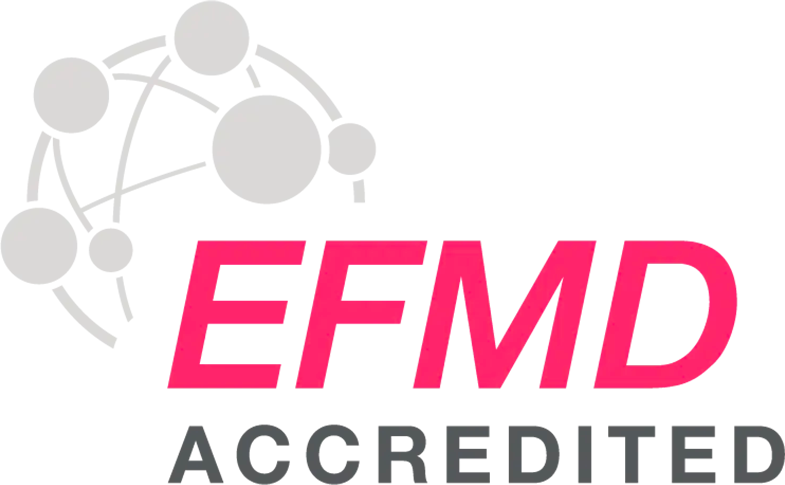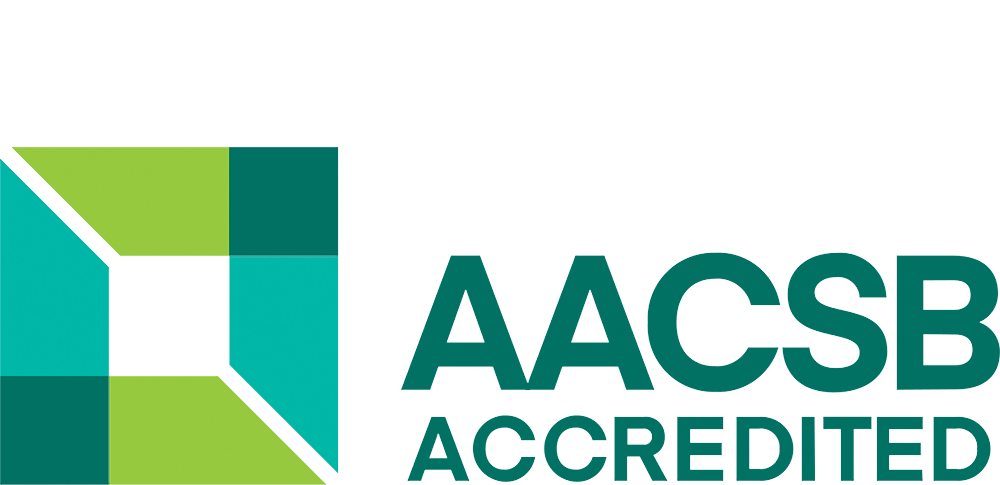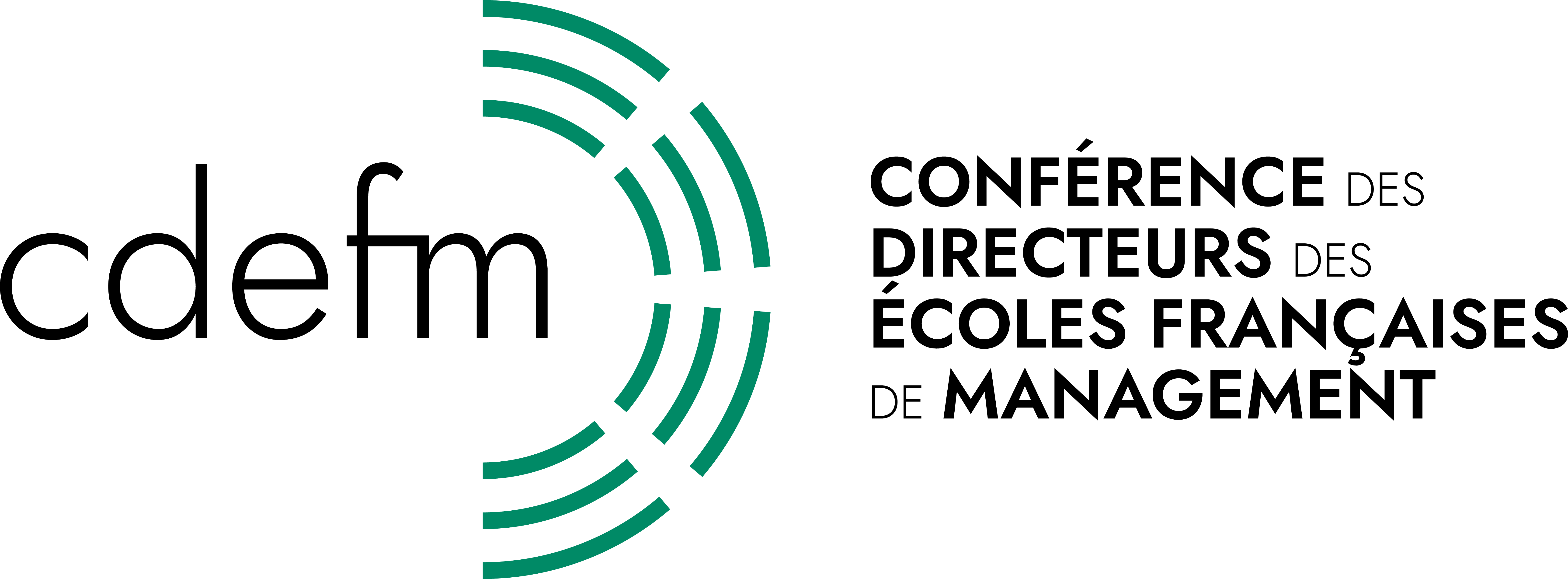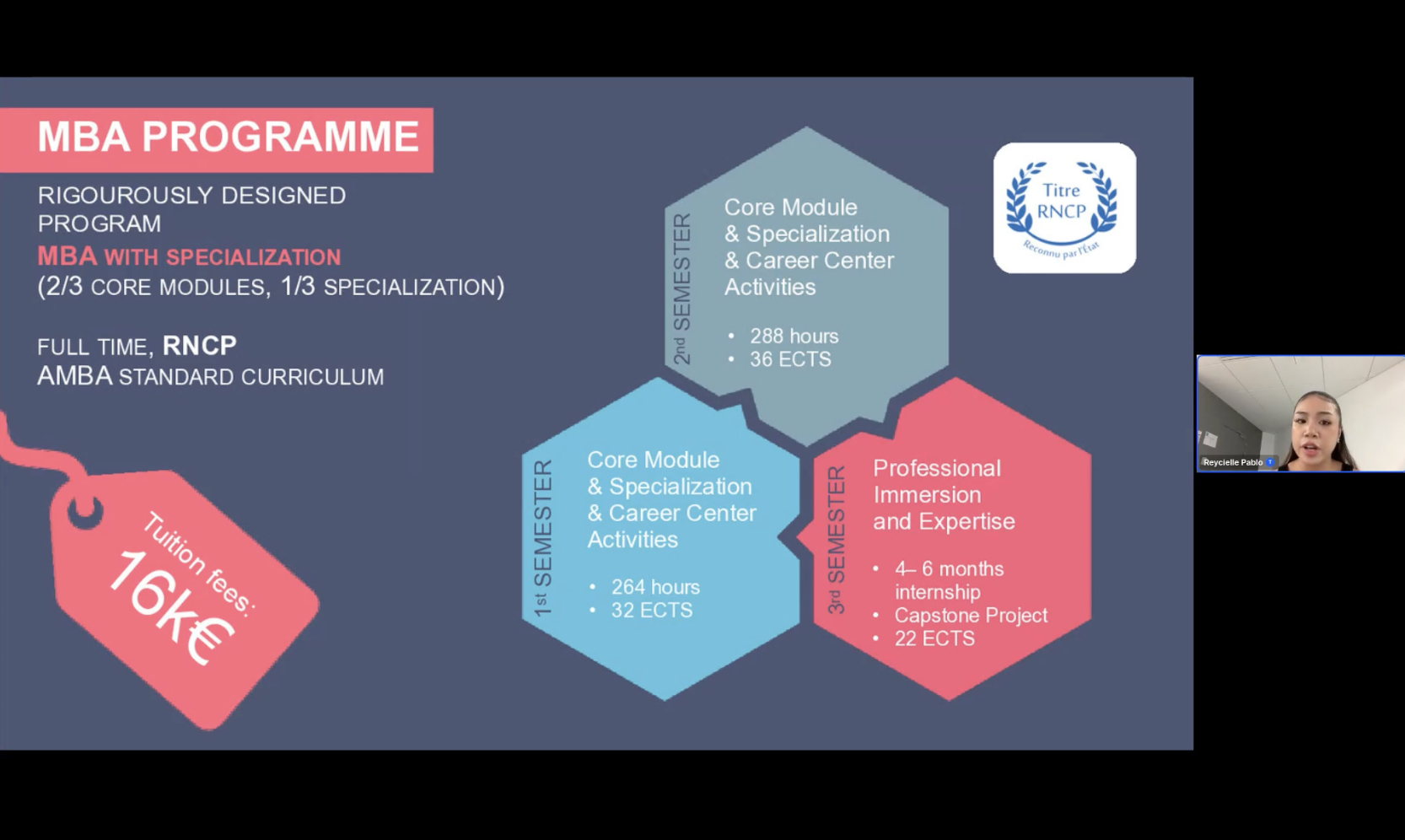06 Mar

Thionville-Luxembourg Open Evening
Are you looking for a business school that combines academic excellence, a rich student life and professional opportunities?


Intake
Pace
Graduation diploma
 English
English
Early Bird offer until 15 April 2026!
10% discount on 2026-2027 tuition fees for all new students enrolled in initial training, subject to payment of a deposit by 15 April 2026.
Prerequisites: Bachelor's degree and at least 3 years of experience OR Bachelor's degree and at least 5 years of experience
Presentation
The MBA is designed for experienced professionals who want to boost or change direction in their careers.
Focused on developing strategic management skills in a globalised, complex, digitalised and constantly changing environment, the aim is to enable students to acquire the essential skills to support companies in meeting their challenges.
The MBA prepares learners to manage multicultural teams, lead complex projects, and make ethical and responsible decisions in contexts heavily impacted by emerging technologies.
Through experiential learning, a solid foundation in fundamental management principles, immersive intercultural engagement and a dynamic international network, the programme promotes adaptive leadership and innovation.
The one-year programme is open to students with three years of professional experience.
The programme leads to a Level 7 professional certification in ‘International Business Development Management’, registered with the RNCP (37738) and awarded by PPA Business School.
The International Business Development and Digital Strategy Design and Transformation MBA programmes are ranked in the Top 20 and Top 18 respectively in the Eduniversal ranking of the best Master's programmes.

Admissions
SUR DOSSIER + ENTRETIEN
Admission requirements
• Bachelor's degree and at least 2 years' experience OR Associate degree and at least 3 years' experience
• Level of English equivalent to TOEFL IBT (internet-based test: 80) or TOEFL PBT (paper-based test: 550) or TOEIC (780) or IELTS: 6.0 or Cambridge (FCE)
• At least 3 years' professional experience
Application form
• CV and covering letter
• Copy of diploma
• Copy of report cards for the year of graduation
• Result of the English test
• Letter of recommendation is a plus (to be sent directly to admissions@ipag.edu)
Stages in the admissions procedure
• Assessment of the application file
• Cover interview - in English
MBA in Paris: Improve your skills with our 5-year MBAs To find out more
The MBA, Master of Business Administration is an Anglo-Saxon degree, created to train high-potential executives, enabling them to acquire managerial skills and a global vision of the company. This training is intended for students as well as for profiles already justifying several years of professional experience.
This prestigious diploma is considered a real professional springboard and is particularly prized and is growing rapidly in France. There are several thousands of them worldwide, some generalists and others more specialized. Don't hesitate to compare them and consult the ranking of the different MBAs to make your choice.
The MBA is designed to be a generalist but firmly practice-oriented degree, which is mainly addressed to technicians, from very different professional backgrounds, who want to take up managerial or even executive positions in a business. It thus aims to develop managerial skills for technical profiles who want to progress in their professional career.
Lectures are becoming rarer and give way to case studies and company projects, with the goal of exchanging as much knowledge as possible between participants. The work is also done in groups, so that students develop certain essential skills, such as diplomatic skills.
It is also an internationally oriented training: a large part of the courses is given in English, and a class often welcomes many international students.
It should be noted that the MBA is a diploma that generally targets profiles who already have experience in the professional world (at least 3 years), and who would be willing to acquire a double expertise. Nevertheless, MBA admissions are often open to students with 4 or 5 years of higher education without experience.
The Master's degree can be completed in two years (M2). It is a 4-year / 5-year degree, normally awarded by universities, but some Grande Ecole programs (such as the IPAG Grande Ecole Programme) can also be awarded the Master's degree.
The cost varies depending on whether it is taken at a university or at a private school, such as a business school.
The French "Conférence des Grandes Ecoles" accredits certain school courses as Specialized Masters (MS) or Master of Science (MSc). These degrees allow students with five years of higher education or four years of higher education with professional experience to acquire a specialisation or a double qualification.
The disparities between these diplomas are slight, as their objective is more or less the same: to help students adapt to the realities of the company and provide them with the necessary skills to be immediately operational. Nevertheless, the MBA aims to specifically train future managers who wish to boost their careers, whereas the Masters are more technical courses.
The main difference between a master's degree and an MBA is its cost. In fact, a master's degree in a university implies minimal tuition fees compared to an MBA.
The target audience for these courses is also different: an MBA is more aimed at working people who want to enhance their skills or even give their professional career a new direction, while admission to a master's degree is open to graduates with a bachelor's degree.
We can also mention the importance of English in the teaching of a Master of Business Administration compared to that of a Master's degree.
Lastly, the organisation of courses is more flexible in an MBA, since it can be completed in one or two years, in a classroom or continuing education program... while the Master's follows the European LMD system: a Master's degree is obtained by validating two semesters, thanks to ECTS credits.
MBAs are known to be very expensive. Their costs can amount to several tens of thousands of euros in the major schools. There are several ways to fund MBAs :
There are many reasons to do an MBA. First and foremost, you need to ask yourself about your professional ambitions because an MBA is a real commitment in terms of time and money.
For technical people (lawyers, engineers), an MBA is an opportunity to acquire a highly prized double skill, and then to progress in the company.
One of the main objectives of an MBA is to learn how to manage. Through this training, the student acquires a cross-functional vision of the company and the skills that are essential to management functions. You learn how to work in a team, make decisions quickly, be diplomatic... By joining this program, you will also add an international dimension to your CV, thanks to the courses given in English and the great cultural diversity found in the promotions.
Naturally, displaying an MBA on your resume is highly valued, especially in terms of salary! An MBA graduate could be entitled to an annual salary of between €60,000 and €80,000 gross, depending on the graduate school he or she has joined.
Finally, one of the advantages of an MBA is the network you will have access to. In fact, you can quickly make very profitable contacts with other participants, lecturers and alumni.
After completing an MBA, it's time to apply your newly acquired skills, be it by returning to your original company, to a management position, or by starting out on the job market again. By including the MBA on your resume, many opportunities and jobs will open up to you and you will obviously be able to qualify for a higher remuneration.
Some MBA graduates, now mastering the basics of business management, do not hesitate to launch themselves into the entrepreneurial path.
To sum up, now is the time to make your professional project a reality!
The programme leads to a Level 7 professional certification in ‘International Business Development Management’, registered with the RNCP (37738) and awarded by PPA Business School.
Alignment of the MBA programme with IPAG's mission and vision
• Preparation for international business: enables students to acquire the skills needed to thrive in dynamic international markets.
• Entrepreneurship and innovation: encourages problem solving, creativity and adaptability in business environments.
• Specialised tracks: offers MBA specialisations in areas such as digital strategy, energy and sustainability, international business development and finance.
• Industry-focused learning: emphasises practical applications, networking and industry collaborations.
• Ethical and responsible leadership: promotes corporate social responsibility and ethical decision-making in a globalised economy.
• Intercultural perspective: emphasises intercultural management and international collaboration to prepare leaders for diverse business contexts.
4 specialisations
As part of this unique RNCP qualification, four specialisations are offered at IPAG:
• International Business Development
• Finance & Investments
• Digital Strategy Design & Transformation
• Energy & Sustainability Transformation
5 skill blocks
Each specialisation allows students to develop sector-specific expertise while building on the five skill sets outlined in the national framework, particularly in:
• Defining and steering an organisation's strategy
• Managing teams and internal resources
• Change management and project management
• Analysing the economic and financial environment
• Implementing a sustainable and responsible management vision
All compulsory and essential subjects in this course provide an essential foundation for understanding the rest of the programme.
Personal and professional development is the process of improving one's skills, qualities and knowledge in order to progress in life and prepare for employment.
Our MBA combines four specialisation options with practical learning, real-world projects and strong support for professional and personal development.
Project Implementation: Capstone Project & Consulting Assignment
Students will be required to carry out a consulting assignment in partnership with a company. Their objective will be to assist the company in developing its strategic model in line with its ambitions.
Scope of intervention
This course combines practical training, professional immersion and personal development to provide a comprehensive and hands-on experience.
The course is based on a dynamic and professional teaching approach, combining theoretical and practical learning in various formats tailored to students' needs.
Examinations are organised to assess the knowledge and skills required to obtain the qualification.
The organisation of skills validation in the reference framework is structured around the following methods:
Objectives
- Understanding the impact of the digitalisation of the economy on different industries and business models
- Managing the digitalisation of a company's value chain
- Digital marketing and distribution, and managing innovation and methods
- Supporting change as a consultant
Courses
Career
Objectives
- A holistic approach to sustainable development
- Development of a sustainable business model
- Knowledge of international policies and the legal framework for sustainable development
- Management of sustainable development projects (indicators, team management)
- Financing sustainable development programmes
- Marketing and communication applied to sustainable development
- Mastering and implementing the concept of a closed-loop supply chain
Courses
Career
Objectives
- Proficiency in investment management tools, including the main drivers of
machine learning applications
- Knowledge of local regulations
- Integration of environmental, social and governance criteria into asset management
- Ability to communicate with quantitative specialists on engineering applications (big and smart data)
- Development of financing projects for sustainable investments
Courses
Career
Objectives
- Understanding the specific characteristics of regional and global markets
- Mastering the principles and rules of international trade
- International negotiations
- Evaluating and developing international business
Courses
Career
Career and events
Upon completion of the programme, learners can progress to senior positions such as unit manager, strategic project manager, business developer, digital transformation manager or organisational strategy consultant.
Events
In conjunction with the Career Centre and the IPAG BS faculty, several workshops/conferences are organised to facilitate networking and help students plan for a new career path.
• Personal branding
• Public speaking
• Private professional coaching sessions
• Meetings with the MBA community
A career centre to support you
Throughout your studies, you will benefit from its many services: interview preparation, CV review, recruitment forums, public speaking workshops, image management, professional social media management, and more...
Fees and funding
Early Bird offer until 15 April 2026!
10% discount on 2026-2027 tuition fees for all new students enrolled in initial training, subject to payment of a deposit by 15 April 2026.
Discover the MBA Program at IPAG Business School!
Watch the replay of our webinar with Reycielle PABLO, our International Promotion Officer, by simply filling out the form below. You will discover, at your own pace, all the key information about the program, including the different specializations offered and career opportunities.
This replay presents an internationally-oriented study program, and you will find answers to all your questions from the comfort of your own home!

Application
Contact